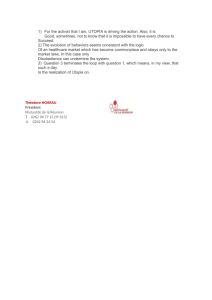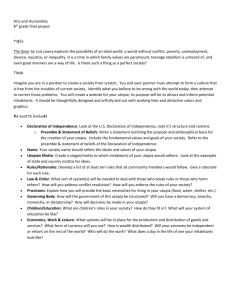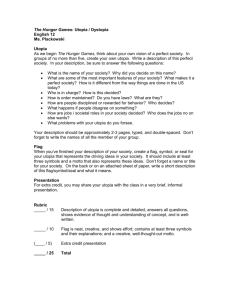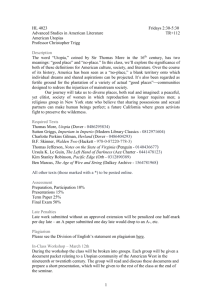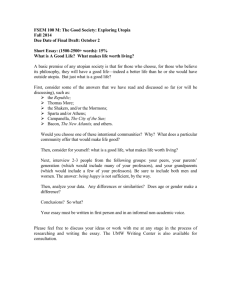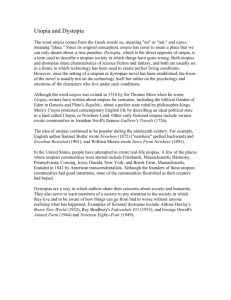3. More's Utopia
advertisement
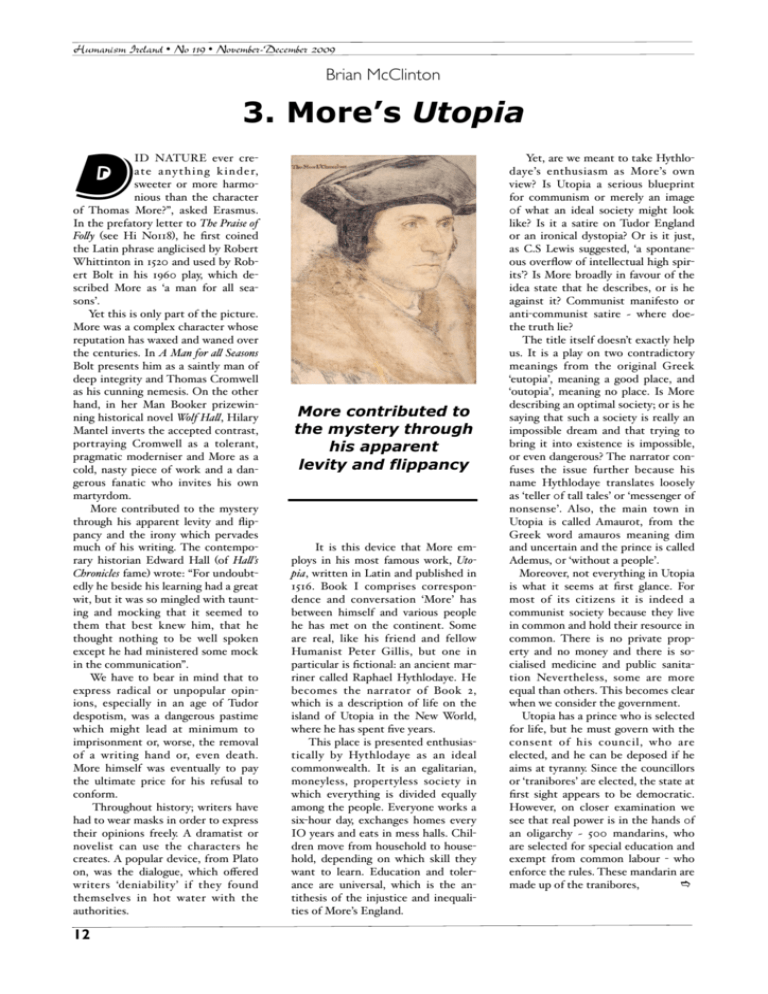
Humanism Ireland • No 119 • November-December 2009 Brian McClinton 3. More’s Utopia D ID NATURE ever crea te a n y t h i n g k i n d e r, sweeter or more harmonious than the character of Thomas More?”, asked Erasmus. In the prefatory letter to The Praise of Fo!y (see Hi No118), he first coined the Latin phrase anglicised by Robert Whittinton in 1520 and used by Robert Bolt in his 1960 play, which described More as ‘a man for all seasons’. Yet this is only part of the picture. More was a complex character whose reputation has waxed and waned over the centuries. In A Man for a! Seasons Bolt presents him as a saintly man of deep integrity and Thomas Cromwell as his cunning nemesis. On the other hand, in her Man Booker prizewinning historical novel Wolf Ha!, Hilary Mantel inverts the accepted contrast, portraying Cromwell as a tolerant, pragmatic moderniser and More as a cold, nasty piece of work and a dangerous fanatic who invites his own martyrdom. More contributed to the mystery through his apparent levity and flippancy and the irony which pervades much of his writing. The contemporary historian Edward Hall (of Ha!’s Chronicles fame) wrote: “For undoubtedly he beside his learning had a great wit, but it was so mingled with taunting and mocking that it seemed to them that best knew him, that he thought nothing to be well spoken except he had ministered some mock in the communication”. We have to bear in mind that to express radical or unpopular opinions, especially in an age of Tudor despotism, was a dangerous pastime which might lead at minimum to imprisonment or, worse, the removal of a writing hand or, even death. More himself was eventually to pay the ultimate price for his refusal to conform. Throughout history; writers have had to wear masks in order to express their opinions freely. A dramatist or novelist can use the characters he creates. A popular device, from Plato on, was the dialogue, which offered writers ‘deniability’ if they found themselves in hot water with the authorities. 12 More contributed to the mystery through his apparent levity and flippancy It is this device that More employs in his most famous work, Utopia, written in Latin and published in 1516. Book I comprises correspondence and conversation ‘More’ has between himself and various people he has met on the continent. Some are real, like his friend and fellow Humanist Peter Gillis, but one in particular is fictional: an ancient marriner called Raphael Hythlodaye. He becomes the narrator of Book 2, which is a description of life on the island of Utopia in the New World, where he has spent five years. This place is presented enthusiastically by Hythlodaye as an ideal commonwealth. It is an egalitarian, moneyless, propertyless society in which everything is divided equally among the people. Everyone works a six-hour day, exchanges homes every IO years and eats in mess halls. Children move from household to household, depending on which skill they want to learn. Education and tolerance are universal, which is the antithesis of the injustice and inequalities of More’s England. Yet, are we meant to take Hythlodaye’s enthusiasm as More’s own view? Is Utopia a serious blueprint for communism or merely an image 0f what an ideal society might look like? Is it a satire on Tudor England or an ironical dystopia? Or is it just, as C.S Lewis suggested, ‘a spontaneous overflow of intellectual high spirits’? Is More broadly in favour of the idea state that he describes, or is he against it? Communist manifesto or anti-communist satire ~ where doe~ the truth lie? The title itself doesn’t exactly help us. It is a play on two contradictory meanings from the original Greek ‘eutopia’, meaning a good place, and ‘outopia’, meaning no place. Is More describing an optimal society; or is he saying that such a society is really an impossible dream and that trying to bring it into existence is impossible, or even dangerous? The narrator confuses the issue further because his name Hythlodaye translates loosely as ‘teller 0f tall tales’ or ‘messenger of nonsense’. Also, the main town in Utopia is called Amaurot, from the Greek word amauros meaning dim and uncertain and the prince is called Ademus, 0r ‘without a people’. Moreover, not everything in Utopia is what it seems at first glance. For most of its citizens it is indeed a communist society because they live in common and hold their resource in common. There is no private property and no money and there is socialised medicine and public sanitation Nevertheless, some are more equal than others. This becomes clear when we consider the government. Utopia has a prince who is selected for life, but he must govern with the consent of his council, who are elected, and he can be deposed if he aims at tyranny. Since the councillors or ‘tranibores’ are elected, the state at first sight appears to be democratic. However, on closer examination we see that real power is in the hands 0f an oligarchy ~ 500 mandarins, who are selected for special education and exempt from common labour - who enforce the rules. These mandarin are made up of the tranibores, Humanism Ireland • No 119 • November-December 2009 the prince himself and the priests. Thus, whereas Plato’s Republic is ruled by philosopher kings, Utopia is governed by a self-perpetuating humanist oligarchy. Moreover, the people have slaves, made up mainly of criminals and prisoners of war, as well as native dissidents. They clean the streets, butcher animals and act as domestic servants (every household has two slaves). So, on closer scrutiny, this communist paradise rests on the forced labour of disenfranchised slaves, including political prisoners. Superficially, Utopia also seems to be a liberal society. Euthanasia and divorce are encouraged, as is freedom of worship. However, a second look muddies the waters again. Working only 6 hours a day leaves a considerable amount of leisure time, and certainly citizens are encouraged to value ‘pleasure’. But it is defined narrowly in terms of ‘frivolity’ or cultivating the mind. Attendance at debates and edifying public lectures is good but fornication is illegal and the death penalty applies for two convictions of adultery. As Hythlodaye says, there are ‘no wine-taverns, no ale-houses, no brothels, no opportunities for seduction, no secret meeting places. And, he adds, “everyone has his eye on you”. At public meal times, everything that is said is overheard, and so ‘the sage gravity and reverence of the elders’ inhibits ‘the younger from wanton licence of words and behaviour’. This smacks of Orwell’s Big Brother society, especially when we are told that it is a capital offence to discuss politics outside the Council, there is no freedom of travel, and each town is surrounded by a wall. Freedom of religion is also not as liberal as it appears. Although there is no established church and almost any religion is tolerated, it is illegal to dispute the immortality of the soul or that virtue is rewarded and vice punished hereafter. Anyone who does is denied citizenship, deprived of all honours and excluded from all offices. Furthermore, the wisest citizens know the truth: “there is a certain divine power, unknown, everlasting incomprehensible, inexplicable, far above the reach and capacity of man’s wisdom, dispersed throughout the world, not in size but in virtue and power. Him they call the Father of All”. Here More is probably revealing his own adherence to a vague form of Christian Platonism. The Utopians are generally pacifists. They ‘detest and abhor war or battle, as a thing beastly, although by no kind of beasts is it practised so much as it is by man’. However, precisely because others are not as virtuous as the Utopians, quarrels will inevitably arise. If they are being attacked, if they wish to conquer other land, or if they wish to free oppressed people ‘from the yoke and bondage of tyranny’, then in the final analysis they may have to hire mercenaries, whom they pay from a ‘treasure’ they keep for such purposes. The main source of mercenaries are the people called Zapoletes, a hideous, savage race who live about 500 miles to the east, born warriors who sell themselves very cheaply and are easily expendable. The 1518 edition of Utopia. Hythlodaye is depicted bottom left From this summary, it is clear that, while Utopia may have some desirable features, it is far from being a perfect society. We might say it suffers the basic defect of most utopias in being a regimented state where the citizen is reduced to a faceless robot with no private life of his own. Indeed, in this case the individual is seen as so dangerous that vigilant watch must be kept on all, in case someone inflicts serious damage on the whole community. More’s own Christian faith is relevant here. Since he believed that social evils were the result of the inherent badness of human nature, the remedy was to devise institutions for social control and to stipulate severe penalties for disobedience. A more optimistic utopian who believes that human nature is capable of improvement might envisage more liberal and humane social institutions. It is, nevertheless true that most major attempts to pursue the ideal of equality have ultimately sacrificed individual freedom in the process. Although it is difficult to know what More really thought, partly because he mixes serious argument and comic irony so readily, there is no reason to believe that he did not genuinely believe in a fairer society. When he writes in his own persona that England is ‘nothing but a certain conspiracy of rich men procuring their own comforts under the name and title of the commonwealth’, we should not doubt his sincerity. This does not mean that he thought Utopia would be a perfect society. Rather, he takes one extreme vision of a bad state (England) and contrasts it with another extreme vision of its apparent opposite (Utopia) and asks us all to move from the former in the direction of the latter without necessarily expecting us to arrive at a final destination. More cloaked radical ideas and questions in extreme and fictional form to make them more palatable and powerful to readers than conventional polemic. And there is one sense in which he was absolutely right: a world without visions of a better future, without ideas of progress, is not worth living in. In this sense, the utopian idea brings an inspirational dimension to human thought which is an invaluable antidote to the pessimism and conservatism of much of modern politics. There is, nevertheless, a sad postscript to this story. Within 10 years, the man who wrote Utopia betrayed his Humanism and became a bigoted persecutor of ‘heresy’. By the time he became Lord Chancellor in 1529, a darker More had emerged. He personally broke into the houses of suspected heretics and arrested them on the spot. Six were burned under his chancellorship, and perhaps forty were imprisoned. Yes, indeed, Thomas Cromwell presided over hundreds of executions, including More himself and Anne Boleyn. But we expect more from More, unless we write novels like Mantel’s Wolf Ha!. Perhaps More made the mistake that Erasmus avoided of becoming embroiled in the dirty, vicious politics of the period. If he had stuck to writing, then ‘the man for all seasons’ might have given us more and better Utopias. 13

